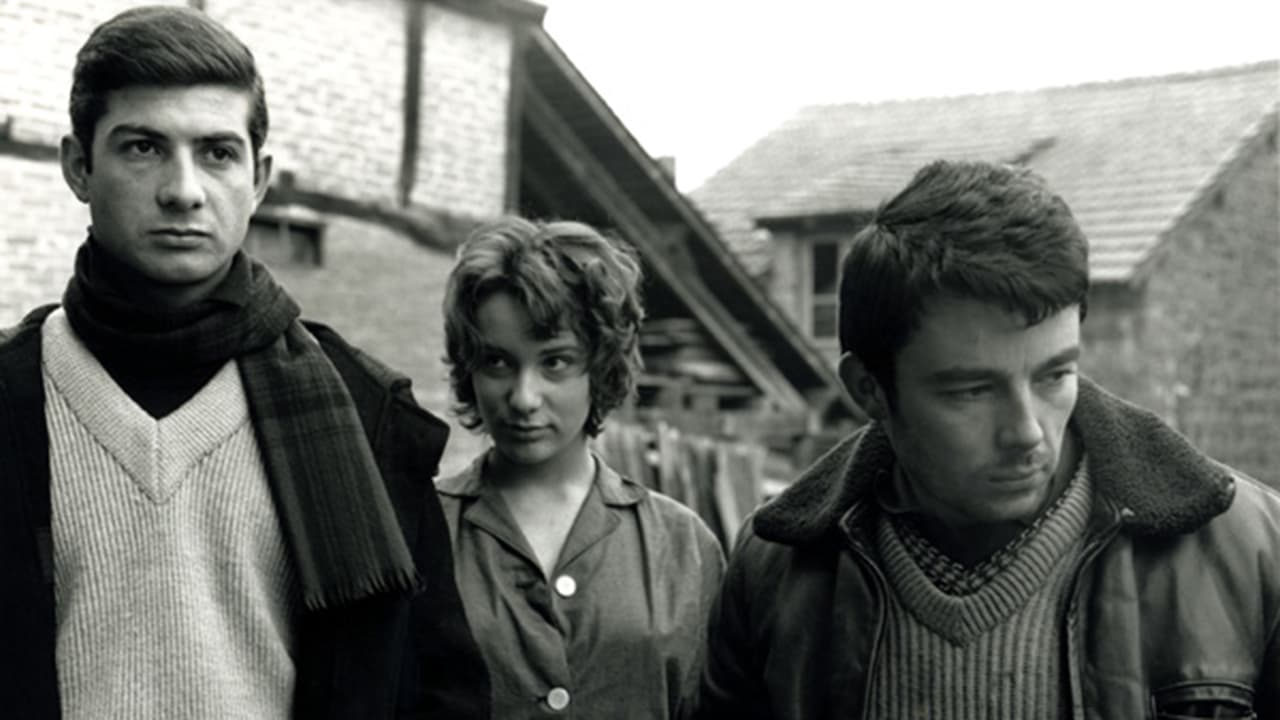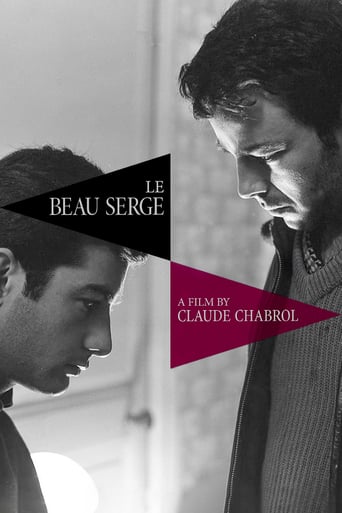Scanialara
You won't be disappointed!
Fairaher
The film makes a home in your brain and the only cure is to see it again.
Roy Hart
If you're interested in the topic at hand, you should just watch it and judge yourself because the reviews have gone very biased by people that didn't even watch it and just hate (or love) the creator. I liked it, it was well written, narrated, and directed and it was about a topic that interests me.
Ezmae Chang
This is a small, humorous movie in some ways, but it has a huge heart. What a nice experience.
avik-basu1889
'Le Beau Serge' by Claude Chabrol is considered by many to be the first French New Wave to have ever been released. The screenplay written by Chabrol himself focuses on a young man named François Baillou who comes back to his childhood village to spend the winter there. He is amazed by how much the village has changed in his absence. He also encounters his old friend Serge who is now a man living a mundane state of existence with his pregnant wife.With a storyline which involves a character going back to his childhood village, one might expect a film that celebrates nostalgia like 'Cinema Paradiso', however 'Le Beau Serge' is anything but a film that wallows in nostalgia. This film brutally shows the discrepancies in the development and spread of modernity between the big cities and the villages in Post WWII France. The people in this particular village are living in a perennial state of hopelessness. They exist because they have to, they have no ambitions, no opportunities and no real goals. François with his urban sensibilities is horrified by the state of affairs here. The screenplay also gives us a bit of a mirror- like relationship between François and Serge. It is implied that their roles could have easily been reversed had things turned out slightly differently. Serge could have been the one who went to the cities while François could have been trapped in this village. This overwhelms François with a sense of guilt to see his childhood friend live in hopelessness. So he decides to bring in a change in attitude towards life in the village as a whole as well as help Serge in almost a Christ-like fashion.The screenplay falters a bit when it comes to the depiction of female characters. The two major female characters, namely Marie and Yvonne are nothing but two female stereotypes on the opposite ends of the spectrum. Chabrol's direction doesn't really add any depths to these characters. Marie is nothing short of a plot device and her choices in the film make little sense. There is also a very disturbing incident that takes place in the film and the justification given for it made it even more shocking and not in the admirable way. Another flaw in the film is the unnecessary way in which the Christ-like nature of François' motives gets verbally referenced by other characters. It was clear and there need not have been the overt declaration of it.Although this was the first New Wave film, but this was before the release of more monumental works like Truffaut's 'The 400 Blows' and Godard's 'Breathless'. So it doesn't have the unique storytelling and editing techniques that were ushered in by those films and feels a little more standard and conventional. As a matter of fact, 'Le Beau Serge' has a bit of an Italian Neo-realist feel to it due to the way the film depicts the sorry and stagnant nature of life in post-war France. The camera moves a lot in the shots and regularly pans rapidly to a particular portion of the shot to reveal something important. Chabrol also uses a lot of tracking shots in the film. Technically the film is well shot and put together.'Le Beau Serge' was a solid first film for Chabrol, it is well directed, competently acted and the story has something to say. But I believe there are also some flaws in the film that I couldn't overlook. It still deserves to be recommended.
tomgillespie2002
Questionably considered the first entry in the Nouvelle Vague, or French New Wave, movement, Claude Chabrol's debut feature serves more as a precursor to the highly influential approach to film- making. While Francois Truffaut and Jean-Luc Godard broke new ground and had surprising international success with The 400 Blows (1959) and A Bout de Soufflé (1960) respectively, Le Beau Serge still retains a classical feel. Still, Chabrol's self-financing, on- location shooting, unorthodox editing and the use of non- professional actors proved to be highly influential to the Cahiers du Cinema crew and the first of its kind.After more than a decade away from his home town, city boy Francois (Jean-Claude Brialy) returns to Sardent for the winter to rest and recover from a recent bout of life-threatening illness. Upon arrival, he notices that the place has barely changed but is oddly deserted, with only a handful of his old friends and acquaintances remaining. One who has remained is Serge (Gerard Blain), Francois' former best friend. The man once dubbed 'handsome Serge' has now been reduced to a bitter alcoholic, trapped in an unhappy marriage with Yvonne (Michele Meritz) who he blames for the loss of his child. Finding himself now at odds with small-town life, Francois still feels compelled to help his old friend.Despite the odd flash of New Wave characteristics, Le Beau Serge shares more in common with the Neo-Realist movement in post-World War II Italy and the 'angry young man' films that would pepper Hollywood throughout the 50's. Chabrol, who grew up in Sardent, captures the crumbling town with both nostalgia and sadness. While obviously fond and whimsical of such a life, Francois' character feels oddly isolated in the town he once called home, unable to understand how accepting its inhabitants are of their inconsequential existence. The narrative drags in places, but this is both a funny and powerful film, especially if you hail from similar small-town beginnings. Chabrol would build his career on thrillers, but his debut shares a sensitive and socially insightful side rarely seen from the director.
al_serrano
Excellent film, does anyone else see similarities to Cat on a hot tin roof, and a number of southern Gothic references.....I read more than I probably should, sham loveless marriage , first child conceived by perve father, Francois and Serge maybe shared more than society would allow, Village priest, hmmm.Beautifully shot and so poetic, Chabrol's most sincere and honest.. just saying....Strong characters that have a grand noble purpose. Not at all apologetic and a testament to faith and hope in a futile, provincial and incestuous post war Europe. You feel their hunger and desperation. So revealing a film, yet it left so much unanswered. Post war French cinema is timeless and classic.
writers_reign
If this really WAS the one that started the new wavelet then it wouldn't be so bad and would never have done the French film industry as much harm as the semi-Amateur Godard would inflict on it. Most directors who are around for several decades display a certain amount of unevenness in their work but Chabrol has got it to a Fine Art. I'm glad I'm not alone - I've been reading some of the other comments here - in finding the music highly risible, so much so that I times I thought it was deliberate parody. More like a documentary that a feature it seldom rises above the ho-hum and Gerard Blain (Serge) must have wondered what he'd let himself in for after seeing at first hand how the Big Boys do it when he worked, two years earlier, with maestro Julien Duvivier on Voice les temps des assassin. See it as a curio but don't miss Neighbours to do so.

